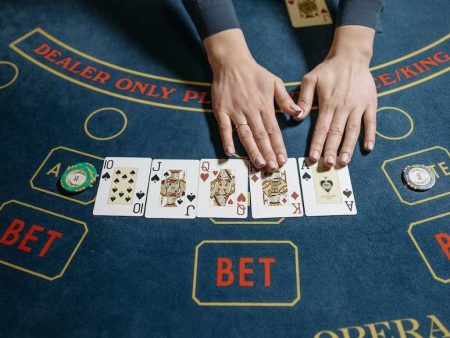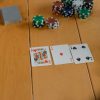Understanding equity is important in making decisions in poker, as it allows a player to compare their expected return to the amount they would need to put into the pot to continue playing.
What is Poker Equity?
Poker equity refers to the proportion of the pot that a player can expect to win on average, given their current hand and the known information about the other players’ hands. It is a measure of a player’s relative strength in a hand and is used to make decisions about whether to bet, raise, or fold.

How to Calculate Equity in Poker?
Equity in poker refers to a player’s approximate probability of winning a hand, based on the current known information. To calculate equity, you can use a program or website like PokerStove or Equilab, which allow you to input the cards of each player and the board, and will then calculate the equity for each player. Another way to calculate equity is to use the “Rule of 2 and 4,” which states that for every unseen card in a deck, a player’s equity will increase or decrease by approximately 2-4%. For example, if a player has a flush draw on the turn, and there are two cards of the same suit still in the deck, their equity would be about 8-16% to complete the flush on the river.
Our Secrets How to Play Using Poker Equity?
Poker equity refers to the theoretical amount of the pot that a player can expect to win, on average, based on their hand strength and the actions of their opponents. To play using poker equity, you should focus on making decisions that will maximize your equity in a given situation. This means considering factors such as pot odds, the strength of your hand, and the likelihood that your opponents will fold, call, or raise. Additionally, it’s important to pay attention to your position at the table, as this can greatly affect your equity in a given hand.
There are a couple of ways to improve your play using poker equity:
- Pot odds: When you are trying to make a decision whether to call or fold, you should always consider your pot odds. This is the ratio of the current size of the pot to the cost of the call you are considering.
- Hand range: It’s important to have a good understanding of the hand range of your opponents. Knowing the range of hands that an opponent is likely to have can help you make better decisions about how to play against them.
- Fold equity: Fold equity refers to the percentage of the time that an opponent will fold when faced with a bet or raise. If you think that your opponent will fold a significant percentage of the time, then it may be a good idea to make a bet or raise, even if you do not have the best hand.
- Position: Position refers to where you are sitting at the table in relation to the dealer. Your position will affect your equity because it will determine how much information you have about your opponents’ actions before you have to act.
- Bluff: Bluffing can be a powerful tool to increase your equity in a hand. When you bluff, you are betting or raising with a weak hand in the hopes that your opponents will fold, allowing you to win the pot without having to show your cards.
By considering these factors, you can make better decisions that will increase your equity in a given hand, and thus improve your overall poker play.
What is Fold Equity in Poker?
Fold equity in poker refers to the potential profit from a player forcing their opponent to fold their hand. This can occur when a player makes a bet or raise that their opponent is unlikely to call, and they therefore fold their hand, allowing the bettor to win the pot without having to show their cards. An example of this would be if a player holds a strong hand, such as pocket aces, and they make a large bet on the river, their opponent holding a weaker hand such as a pair of threes, is likely to fold, giving the player with pocket aces fold equity.

Poker Equity Calculators
Poker equity calculators are tools that help players determine the likelihood of winning a hand in a given situation. They work by simulating a large number of possible outcomes of a hand and using the results to calculate the equity (or expected value) of a particular hand or range of hands. These calculators can be used to analyze different betting strategies, identify profitable situations, and make more informed decisions at the poker table. Some popular poker equity calculators include PokerStove, Equilab, and HoldemResources Calculator.
An example of a poker equity calculator is the PokerStove software. This program allows users to input specific hand ranges and board textures, and calculates the equity (or expected value) of each hand. For example, if a player inputs a range of hands that they believe their opponent is likely to have, and the flop comes down J-10-5, the calculator will determine the percentage chance that each hand in the opponent’s range has of winning the pot. This information can be used to make informed decisions during the game and improve overall strategy.
F.A.Q.s
What is an equity calculator poker?
An equity calculator poker is an amazing poker tool for anyone looking to enhance their poker odds and increase their chance of winning. What makes it so special is its ability to quickly calculate a poker player’s equity in any given pot situation or against any opponent range. With such a helpful assistant, poker players can quickly analyze the odds of victory and make informed decisions in only seconds. If you’re serious about poker, don’t miss the opportunity to have an equity calculator poker on your side.
Can you use a calculator to identify your equity?
Do you feel lost when trying to decide what equity you have? Look no further! Calculators are an incredibly useful tool for working out how much equity a gambler has in their hand so they can maximize their winnings. There are many different types of calculators available, each allowing players to learn how to calculate and identify whatever equity they may have. By knowing the correct usage of such tools, one is able to understand the authentic value of their hand and the potential that it holds. This knowledge is an invaluable asset in any gambler’s arsenal – not only will it be beneficial on the table, but also affect decisions away from the felt.
What is denying equity in poker?
Denying equity in poker is a strategy employed in certain situations to increase range advantage. Basically, it involves opting against some of your range of hands to balance out your opponent’s range. This may sound pretty counter-intuitive, but in the right spots it can work wonders. Through denying equity players can narrow down the range of hands their opponent has and this allows them to make a more educated decision when playing. Of course, novice players should not be messing around with this method yet but for those with more experience it could become an incredibly powerful tool for improving your poker game.














